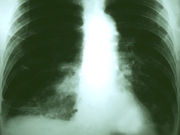Pooled analysis shows substitution with polyunsaturated fat reduces risk of carcinoma
FRIDAY, July 28, 2017 (HealthDay News) — High intake of total and saturated fat is associated with increased risk of lung cancer, according to research published online July 25 in the Journal of Clinical Oncology.
Jae Jeong Yang, Ph.D., M.P.H., from Vanderbilt University Medical Center in Nashville, Tenn., and colleagues examined the correlations of total and specific types of dietary fat with lung cancer risk in a pooled analysis of 10 prospective cohort studies from the United States, Europe, and Asia.
The researchers identified 18,822 incident cases of lung cancer among 1,445,850 participants during a mean follow-up of 9.4 years. There was a correlation for high intakes of total and saturated fat with increased risk of lung cancer (hazard ratios, 1.07 and 1.14 for highest versus lowest quintile, respectively). The positive correlation for saturated fat was stronger for current smokers versus former/never smokers (hazard ratio, 1.23) and for squamous cell and small cell carcinoma versus other histologic types (hazard ratios, 1.61 and 1.40, respectively). The risk of lung cancer was reduced for high intake of polyunsaturated fat (hazard ratio, 0.92). The risk of small cell and squamous cell carcinoma was 16 to 17 percent lower with a 5 percent energy substitution of saturated fat with polyunsaturated fat.
“Modifying dietary fat intake (i.e., replacing saturated fat with polyunsaturated fat) may reduce lung cancer risk, particularly among smokers and for squamous cell and small cell carcinoma,” the authors write.
Copyright © 2017 HealthDay. All rights reserved.








